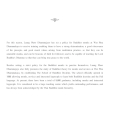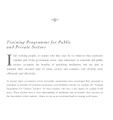public policy : ค้นหาหนังสือธรรมะ หน้า 1 / 1
หน้าหนังสือทั้งหมด

36
Dealing With the New Middle East
Dealing With the New Middle East
The Bush administration's attempt to shape a new Middle East has been a major factor in the emergence of the new and extremely problematic realities we have discussed
The Bush administration's policies have complicated the realities in the Middle East. A new approach is needed, prioritizing diplomacy and a clear understanding of U.S. limits in the region. Confronta

37
U.S. Foreign Policy in the Middle East: Fostering Stability and Addressing Security Challenges
policy in Iraq and of the Palestinian–Israeli peace process. The United States needs to recognize that terrorism is not the result of blind hatred of Western civilization, as the Bush administration i
This text argues that U.S. policies in the Middle East must shift to address underlying political issues to effectively curb terrorism and ensure oil flow. It outlines critical tasks for U.S. engageme

27
Realties of the New Middle East
REALTIES OF THE NEW MIDDLE EAST 21
otherwise unwelcome consequences..... And another message should be equally clear: leaders who abandon the pursuit of chemical, biological and nuclear weapons, and
This text discusses the complexities and challenges in the New Middle East, particularly regarding nuclear ambitions of countries like Saudi Arabia and Egypt, and the decline of the U.S. freedom agend

28
The New Middle East: Democracy vs. Stability
22 THE NEW MIDDLE EAST
few, limited in scope, carried out only when allowed by incumbent regimes, and dropped quickly when governments objected.
After September 11, President Bush openly repudiated th
This text discusses the shift in U.S. foreign policy in the Middle East following the September 11 attacks. President Bush's declaration of aligning American values of freedom and security contrasted

10
The Reality of the New Middle East
The Reality of the New Middle East
The first step toward the formulation of a new policy is to understand the realities of the new Middle East as it is now. The three clusters of countries — Iran–Ira
The new Middle East is defined by three country clusters: Iran–Iraq, Lebanon–Syria, and Palestine–Israel, intertwined with issues such as nuclear proliferation and sectarianism. The U.S. faces not jus

17
The Complexity of Syrian-Lebanese Relations
represented by the March 8 forces led by Hizbollah and the Syrian regime, seen as proxies for Iran and its policy of regional domination. The Syria–Lebanon cluster, in this view, is at the center of t
This content discusses the influence of Syria and Iran on Lebanon's political environment, particularly the roles of the March 8 forces led by Hizbollah, and the March 14 coalition resisting Syrian co

46
About the Authors of Carnegie Endowment Publications
…from 1989 to 1999 he founded and directed the Lebanese Center for Policy Studies, Lebanon’s leading public policy think tank. He is a regular commentator on television, radio, and in print on political issues rela…
…. Lastly, Paul Salem, director of the Carnegie Middle East Center, has played a significant role in public policy and commentary on Arab political matters. For further information, visit dmc.tv.

42
The Evolving Dynamics of Power in the Middle East
36 THE NEW MIDDLE EAST
restoring a balance of power that is not entirely dependent on a long-term, large U.S. military presence with its financial costs and negative political perceptions in the regi
This text discusses the changing power dynamics in the Middle East, particularly the region's responses to Iranian influence and the evolving role of the U.S. Historically reliant on American support,

43
Reassessing U.S. Policy Toward Syria and Democracy in the Middle East
A new policy toward Syria also needs to recognize the country for what it is: a small country without massive ambitions or ideological crusades, trying to maintain some role in the region. The confron
This text discusses the need for a nuanced U.S. policy toward Syria, recognizing its limited ambitions while encouraging a shift away from its spoiler role in Lebanon and alignment with Iran. It furth

47
Carnegie Endowment for International Peace
Carnegie Endowment for International Peace
The Carnegie Endowment for International Peace is a private, nonprofit organization dedicated to advancing cooperation between nations and promoting active
The Carnegie Endowment for International Peace is a nonprofit organization focused on fostering cooperation between nations and enhancing U.S. involvement globally. Established in 1910, this nonpartis

4
Carnegie Endowment Publication Notice
…m the Carnegie Endowment.
The Carnegie Endowment normally does not take institutional positions on public policy issues; the views represented here do not necessarily reflect the views of the Endowment, its staff…
…permission. It also highlights that the Endowment does not take official institutional positions on public policy issues. For more information or to request a publication, visit dmc.tv.

126
Training and Educational Policies at Wat Phra Dhammakaya
For this reason, Luang Phaw Dhammajayo has set a policy for Buddhist monks at Wat Phra Dhammakaya to receive training enabling them to have a strong determination, a good observance of the precepts, a
Luang Phaw Dhammajayo has implemented a training policy for Buddhist monks at Wat Phra Dhammakaya, emphasizing strong determination, observance of precepts, and moral values cultivated through meditat

8
Challenges of U.S. Democracy Promotion in the Middle East
There has been no successful democratic revolution in any Middle Eastern country. Instead, the democratic openings advocated and supported by the United States have either led to sectarian division or
This text discusses the lack of successful democratic revolutions in the Middle East, largely due to U.S. policies that have often led to sectarian division and the empowerment of Islamist groups. It

23
Challenges in U.S. Policy Toward Palestinian Elections
Palestinian legislative elections to proceed credibly — but then led to an immediate American effort to overturn the result through any possible means.
The Bush administration’s short attention span f
The text discusses the complications surrounding the Palestinian legislative elections and the subsequent U.S. effort to undermine the democratic outcome, particularly emphasizing the Bush administrat

39
Strategic Engagement and Policy Reform in Iraq
To be sure, engagement offers no guarantees of success. It is the Iranian government that ultimately must make a strategic decision to change its own policies. The best thing Washington can do is main
This text discusses the necessity for strategic dialogue between the U.S. and Iran, emphasizing the importance of Iran's willingness to modify its policies. It asserts that the U.S. should provide Ira

41
Navigating the Complexities of U.S.-Middle East Relations
But it is impossible to turn back the clock to more propitious circumstances. The biggest tension—between integrating Hamas and denying the movement its proclaimed goal of destroying Israel—can only b
The text discusses the challenges of integrating Hamas while managing its actions against Israel. It stresses the importance of regional pressures and U.S. support for a unified Palestinian government

44
Challenges of Democracy Promotion in the Middle East
38 THE NEW MIDDLE EAST
must be clearly defined; in the Middle East, the concept of democracy promotion has fluctuated from aggressive rhetoric of regime overthrow at one extreme to small, little noti
The text discusses the fluctuating concept of democracy promotion in the Middle East, highlighting the confusion between promoting democracy and regime overthrow. It emphasizes the need for the U.S. t

16
The Complex Relationship Between the U.S. and Iran
to be cooperative on its own terms and for its own interests, but this does not mean that the United States is in a strong position to push Iran to comply with its requests, particularly at present. T
This text explores the multifaceted relationship between the United States and Iran, emphasizing the challenges faced by U.S. military policy amidst high oil prices and ongoing conflicts. It discusses

21
Realities of the New Middle East: The Two-State Solution
REALITIES OF THE NEW MIDDLE EAST 15
tion of the international consensus, obscures a deeper problem: realities on the ground have already destroyed much of the viability of the two-state solution. The
The viability of the two-state solution in the Israeli-Palestinian conflict is increasingly in question due to the weakened Palestinian leadership and diminishing trust between Palestinians and Israel

72
Training Programme for Public and Private Sectors
Training Programme for Public and Private Sectors
ull working people, no matter who they may be or whatever they represent: whether part of the government sector, state enterprises or corporate and p
The text discusses the vital role of meditation in improving the mindset of individuals in both the public and private sectors. By encouraging working personnel to engage in meditation and morality de
